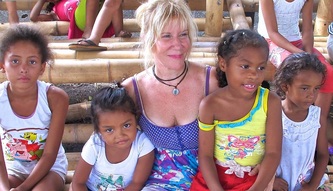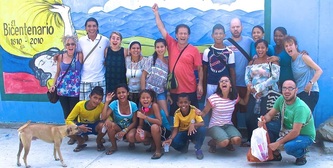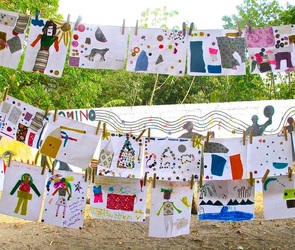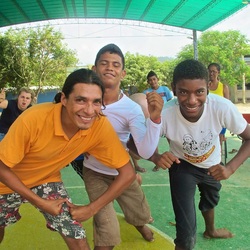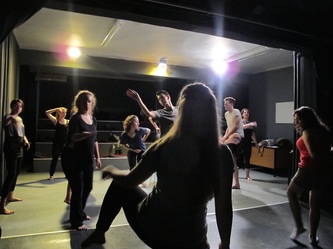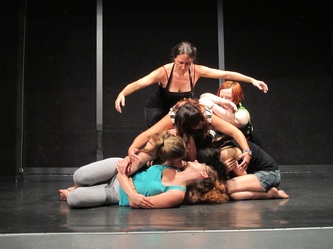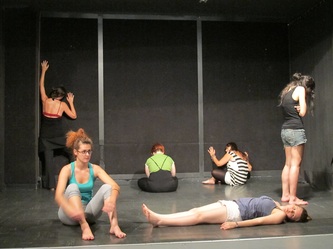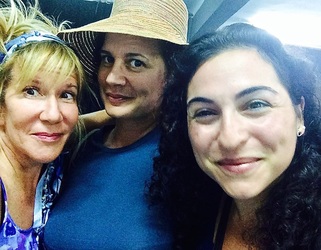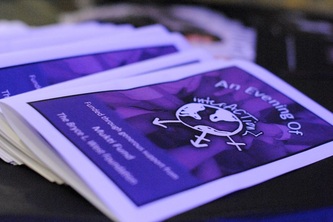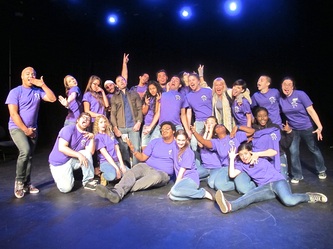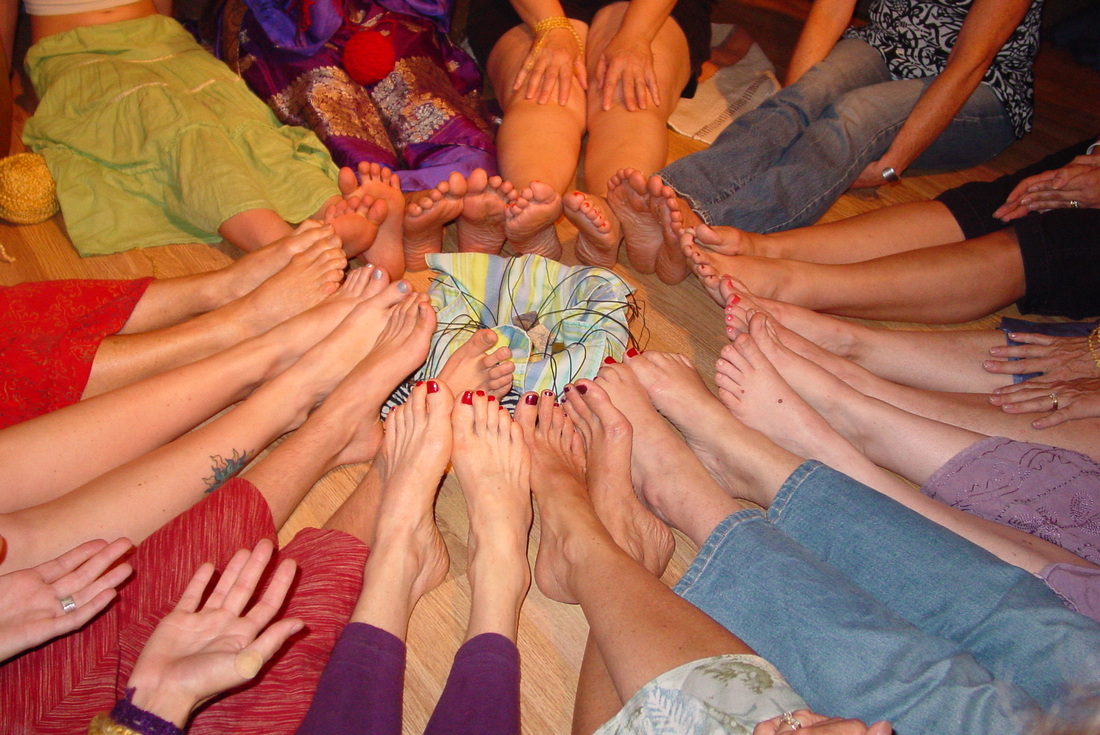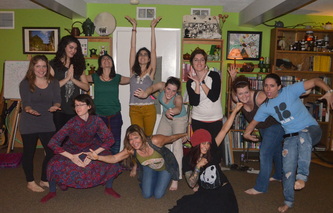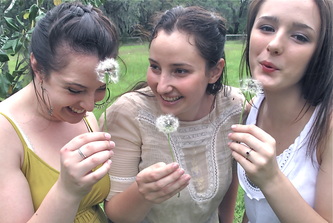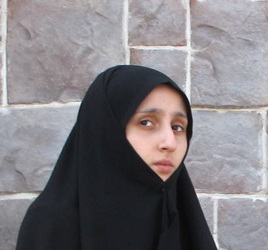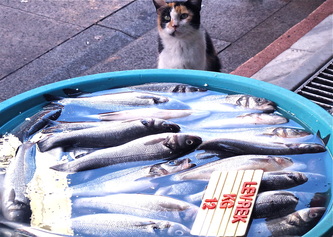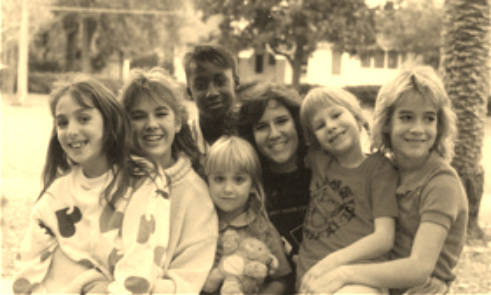PLAYBACK UCF
Playback Theatre is an interactive form of improvisational storytelling in which audience members are invited, but never required, to share stories from their lives and then watch them "played back" on the spot through theatre, music, metaphor, and fabric. Playback is rooted in community building and in the belief that all our stories are worthy of being shared. Let's watch...
Art in Odd PlacesArt in Odd Places (AiOP) aims to stretch the boundaries of communication in the public realm by presenting artworks in all disciplines outside the confines of traditional public space regulations. AiOP reminds us that public spaces function as the epicenter for diverse social interactions and the unfettered exchange of ideas.
Created by students in two honors classes at the University of Central Florida (Creative Processes: Theory and Practice and Theatre Survey), this interactive performance art installation involves collaborative community art-making revolving around a theme of "play." Students in costumes, that blend business attire with children’s wear, remind us to Never Stop Playing no matter our age. Passersby are invited to contribute to and interact with art projects such as: WISHING TREE Share your wishes on beautiful ribbons, tie them to our Wishing Tree, and allow them to rise on the wind. CLOTHESLINE OF DREAMS Color a picture of childhood dream job, on the flip side color a picture of your current major. Hang them on our colorful clothesline of dreams. BLANKET FORT We know you work hard, so crawl inside our blanket fort for a rest. Not feeling sleepy? Come play with us! We have hula hoops, hopscotch, coloring books, jump rope, bubbles, music, and more. CHALK ART Playful chalk art drawn on sidewalks and walls invite you to interact with them for photo opportunities. |
|
Transformational Theatre: Raising Consciousness While Honing A Craft
A look inside an Acting for Non-Majors class utilizing theatre for social change inspired assignments such as personal performance art and Playback Theatre.
UCF Rising! Applied Bystander Prevention Workshop
Using Theatre for Social Change Techniques

Developed in partnership with UCF Victim Services and the School of Performing Arts, this bystander prevention workshop combines theatrical skills with victim advocacy and prevention training. Selections from Eve Ensler’s The Vagina Monologues and One Billion Rising precede the workshop.
Community Impact Statement:
Implemented through performance and forum theatre, we aim to foster a community of leaders and game changers in a hands-on “practice for life.” Participants learn and discuss social topics pertaining to sexual and domestic violence, while developing preventative skills that encourage proactive and reactive social behaviors in an effort to reduce sexual assault and stalking rates on college campuses through performative and creative based activities.
The Workshop:
This workshop intertwines the ideologies and theories of the creative and legal justice worlds, and is rooted in the methodologies of Augusto Boal’s Theatre of the Oppressed. The workshop was created by School of Performing Arts graduate student Elizabeth Fay and Faculty Mentor Sybil St. Claire, in partnership with UCF Victim Services. It has been used in a number of community training sessions throughout campus including UCF School of Performing Arts, Campus Peace Coalition, and ROTC Army branch.

Professor St. Claire Receives Teaching Award
The award, which recognizes and honors teaching innovation, excellence, and impact both in and out of the classroom, is the culmination of an exhaustive study of the candidate's career as an educator. Awarded to only a select few annually by the University of Central Florida, the Teaching Incentive Award includes a permanent $5,000 a year raise. The University of Central Florida is the second largest university in the nation. With over 63,000 students and almost 2,000 faculty, UCF is one of only 25 public universities with the Carnegie Foundation's Highest Designation in two categories: community engagement and very high research activity,
The award, which recognizes and honors teaching innovation, excellence, and impact both in and out of the classroom, is the culmination of an exhaustive study of the candidate's career as an educator. Awarded to only a select few annually by the University of Central Florida, the Teaching Incentive Award includes a permanent $5,000 a year raise. The University of Central Florida is the second largest university in the nation. With over 63,000 students and almost 2,000 faculty, UCF is one of only 25 public universities with the Carnegie Foundation's Highest Designation in two categories: community engagement and very high research activity,
Simply Sybil

The Fourth Wall
by Kathy Quinjaro
Wait! I must be mistaken-there is NOTHING simple about Professor Sybil St. Claire. Have you perhaps done a double take after spotting a forest sprite with flowing blonde hair, bright brown eyes, and genuine smile gliding through the UCF Performing Arts Center? Well, I have and let me assure you it was not a dream. Sybil and I sat and visited for a while and caught up. Well, she ran and I TRIED to catch up!
Let’s see…her summer was spent as a Master Teacher in Athens, Greece teaching Theatre of the Oppressed workshops on using personal stories as source material for collaborative playmaking, and in Palomino, Colombia, where she lived off of the grid working with ImagineAction, a traveling Theatre of the Oppressed. Applying techniques such as psychodrama, storytelling, drumming, and creative ritual with local people (who suffer from drug wars, government abandonment, police corruption, and poverty), Sybil’s work is focused on peace-building and personal transformation. “I’m fascinated with using theatre as ritual to weave the wounded back into the community.” She says, “…And with finding the medicine in our stories.”
So what does this marvelous woman do for her own entertainment? Well, she is also an internationally produced and published writer. Her most recent work can be found in the anthology, Scenes and Monologues of Spiritual Experience from the Best Contemporary Plays, a collection that also features authors such as Arthur Miller and Tony Kushner. Sybil is also a screenwriter and she collaborates with some of Broadway’s best. Locally, she also performs with the tribal drumming band, Flammable Babylon!
Most importantly, Sybil is the one who created interACTionZ; one of the nations’ first youth theatres for social change. This partnership between UCF’s Department of Theatre, the Zebra Coalition (which works primarily with homeless queer youth), the Orlando Repertory Theatre (a professional theatre for young audiences), and the Orange County Public School system is a gay/straight alliance that explores LGBTQ+ issues as well as oppression in its many forms. In fact, if you are interested, interACTionZ is looking for volunteers and you can earn college credit for helping out! interACtionZ conducts workshops using modalities such as digital storytelling and forum theatre. interACTtionZ also performs locally! Now being directed by Jonathan Jackson (one of St. Claire’s graduate students from the MFA in Theatre for Young Audiences program), interACTionZ won UCFs Excellence in Academic Partnerships award this year!
Soon we will begin signing up for the Spring semester and St. Claire will be teaching her Theatre for Social Change class through the Burnett Honors College at UCF. In this class, students learn how to apply the techniques of theatre for social change out in the community. Past student-created workshops have included, Beyond Belief: An Inter-Faith workshop, NO: A Workshop on Consent, Is Gossip Violence? Check Your Privilege, All You Need is (Self) Love, and My Phone and I Are Facebook Official. Sybil also teaches classes such as Storytelling, Acting, Dramatic Literature, Theatre History, and Methods of Teaching Drama.
When I looked up her name in my baby name book to see how it measures up, this is what I found. Sybil means “female prophet”, St. (Saint), Claire means “clear, bright, famous.”
Clear, bright, famous female prophet.
Nothing simple there, just our very own forest sprite out on a mission to change the world – one heart at a time.
Click here for more information on interACTionZ and how to become a volunteer!
The Fourth Wall
by Kathy Quinjaro
Wait! I must be mistaken-there is NOTHING simple about Professor Sybil St. Claire. Have you perhaps done a double take after spotting a forest sprite with flowing blonde hair, bright brown eyes, and genuine smile gliding through the UCF Performing Arts Center? Well, I have and let me assure you it was not a dream. Sybil and I sat and visited for a while and caught up. Well, she ran and I TRIED to catch up!
Let’s see…her summer was spent as a Master Teacher in Athens, Greece teaching Theatre of the Oppressed workshops on using personal stories as source material for collaborative playmaking, and in Palomino, Colombia, where she lived off of the grid working with ImagineAction, a traveling Theatre of the Oppressed. Applying techniques such as psychodrama, storytelling, drumming, and creative ritual with local people (who suffer from drug wars, government abandonment, police corruption, and poverty), Sybil’s work is focused on peace-building and personal transformation. “I’m fascinated with using theatre as ritual to weave the wounded back into the community.” She says, “…And with finding the medicine in our stories.”
So what does this marvelous woman do for her own entertainment? Well, she is also an internationally produced and published writer. Her most recent work can be found in the anthology, Scenes and Monologues of Spiritual Experience from the Best Contemporary Plays, a collection that also features authors such as Arthur Miller and Tony Kushner. Sybil is also a screenwriter and she collaborates with some of Broadway’s best. Locally, she also performs with the tribal drumming band, Flammable Babylon!
Most importantly, Sybil is the one who created interACTionZ; one of the nations’ first youth theatres for social change. This partnership between UCF’s Department of Theatre, the Zebra Coalition (which works primarily with homeless queer youth), the Orlando Repertory Theatre (a professional theatre for young audiences), and the Orange County Public School system is a gay/straight alliance that explores LGBTQ+ issues as well as oppression in its many forms. In fact, if you are interested, interACTionZ is looking for volunteers and you can earn college credit for helping out! interACtionZ conducts workshops using modalities such as digital storytelling and forum theatre. interACTtionZ also performs locally! Now being directed by Jonathan Jackson (one of St. Claire’s graduate students from the MFA in Theatre for Young Audiences program), interACTionZ won UCFs Excellence in Academic Partnerships award this year!
Soon we will begin signing up for the Spring semester and St. Claire will be teaching her Theatre for Social Change class through the Burnett Honors College at UCF. In this class, students learn how to apply the techniques of theatre for social change out in the community. Past student-created workshops have included, Beyond Belief: An Inter-Faith workshop, NO: A Workshop on Consent, Is Gossip Violence? Check Your Privilege, All You Need is (Self) Love, and My Phone and I Are Facebook Official. Sybil also teaches classes such as Storytelling, Acting, Dramatic Literature, Theatre History, and Methods of Teaching Drama.
When I looked up her name in my baby name book to see how it measures up, this is what I found. Sybil means “female prophet”, St. (Saint), Claire means “clear, bright, famous.”
Clear, bright, famous female prophet.
Nothing simple there, just our very own forest sprite out on a mission to change the world – one heart at a time.
Click here for more information on interACTionZ and how to become a volunteer!

Theatre of the Oppressed in Palomino, Colombia
Living off the grid in a communal hostel, a group of international Theatre of the Oppressed Practitioners brought Forum Theatre to Palomino, Colombia. Mornings were spent in workshops learning and practicing Forum Theatre, Rainbow of Desire, and Theatre of Witness. Afternoons were spent applying the work out the community.
In the middle of this ecological conclave at the foot of the Sierra Nevada de Santa Marta, we worked with diverse ethnic and cultural groups such as indigenous and afro-Colombian communities that have long suffered as a result of the armed conflict. They continue to endure a human rights crisis, regularly confronting forced displacement, loss of cultural identity, racial discrimination, lack of environmental protection and abandonment by governmental institutions.
Facilitated by ImaginAction, a touring Theatre of the Oppressed led by Hector Aristizabal and Allesia Cortoni. Hosted by Hostel Media Luna.
Living off the grid in a communal hostel, a group of international Theatre of the Oppressed Practitioners brought Forum Theatre to Palomino, Colombia. Mornings were spent in workshops learning and practicing Forum Theatre, Rainbow of Desire, and Theatre of Witness. Afternoons were spent applying the work out the community.
In the middle of this ecological conclave at the foot of the Sierra Nevada de Santa Marta, we worked with diverse ethnic and cultural groups such as indigenous and afro-Colombian communities that have long suffered as a result of the armed conflict. They continue to endure a human rights crisis, regularly confronting forced displacement, loss of cultural identity, racial discrimination, lack of environmental protection and abandonment by governmental institutions.
Facilitated by ImaginAction, a touring Theatre of the Oppressed led by Hector Aristizabal and Allesia Cortoni. Hosted by Hostel Media Luna.

Sybil St. Claire's work published in Scenes and Monologues of Spiritual Experience from the Best Contemporary Plays
A new anthology (Scenes and Monologues of Spiritual Experience from the Best Contemporary Plays) features the work of UCF Theatre Professor Sybil St. Claire. Her contribution, Wake Me When It's Over, inspired by her idiosyncratic Irish Catholic upbringing and the practice of three-day wakes, humorously and tenderly explores spirituality through a teenage lens.
The anthology embraces various aspects of spirituality---religious faith, martyrdom, death and afterlife, fate and destiny, mercy, and romantic love. Some of the plays sourced for this anthology include, The Crucible, Doubt, In the Shape of a Woman, Agnes of God, and Angels in America.
Professor St. Claire Teaches Theatre of the Oppressed Master Class in Athens, Greece
During a whole week of creative interaction, Theater Makers from different parts of the world had the opportunity to share and get acquainted with new methods and ideas in acting, movement, and voice as part of The 10th International Festival of Making Theatre. Held in English, the festival is an opportunity for international students to work alongside master teaching artists from Turkey, Greece, Hungary, Italy, America, France, Egypt, and the United Arab Emirates.
Using devising techniques St. Claire's workshop focused on creating liberatory Theatre of the Oppressed performances using personal stories as source material. Other workshops included, The Neutral Mask, Actor as Athlete: Yoga, Suzuki Training and Other Physical Work, From Page to the Stage: Voice, Movement, and Shakespearean Performance, Body Percussion, Movement for Actors: Michael Chekhov, Bodysonic: Exploring the Physicality and Emotions of Sound, and Narrative Storytelling.
Using devising techniques St. Claire's workshop focused on creating liberatory Theatre of the Oppressed performances using personal stories as source material. Other workshops included, The Neutral Mask, Actor as Athlete: Yoga, Suzuki Training and Other Physical Work, From Page to the Stage: Voice, Movement, and Shakespearean Performance, Body Percussion, Movement for Actors: Michael Chekhov, Bodysonic: Exploring the Physicality and Emotions of Sound, and Narrative Storytelling.
Professor St. Claire wins UCF Excellence in Academic Partnerships Award

Awarded for the creation of interACTionZ: a queer youth theatre for social change.
A partnership between TheatreUCF, The Zebra Coalition, The Orlando Repertory Theatre, and the Orange County Public School system
interACTionZ is one of only a handful of theatres like it in the nation. Our population consists of Zebra youth (many of whom are homeless), UCF students from multiple majors, and Orange County public high school students. Blending these population together we explore bullying, community and peace-building, internalized oppression, conflict resolution, consent, vertical hostility, and LBGTQ+ issues using theatre for social change techniques.
Together, we foster safe space from which to explore, create, have fun, and just "be" without fear of oppression. In addition, interACTionZ creates and performs original theatre using the personal stories of our participants as source material. We also offer theatre for social change workshops on campus and within the community.
A partnership between TheatreUCF, The Zebra Coalition, The Orlando Repertory Theatre, and the Orange County Public School system
interACTionZ is one of only a handful of theatres like it in the nation. Our population consists of Zebra youth (many of whom are homeless), UCF students from multiple majors, and Orange County public high school students. Blending these population together we explore bullying, community and peace-building, internalized oppression, conflict resolution, consent, vertical hostility, and LBGTQ+ issues using theatre for social change techniques.
Together, we foster safe space from which to explore, create, have fun, and just "be" without fear of oppression. In addition, interACTionZ creates and performs original theatre using the personal stories of our participants as source material. We also offer theatre for social change workshops on campus and within the community.
The Happiness Project

Living our best life involves the ability to cultivate contentment with the past, happiness in the present, and hope for the future.
Using Theatre for Social Change techniques we will explore how we sabotage our own contentment, happiness, and hope through internalized oppression in the form of negative self-talk as we confront our inner bully and have the courage to be happy...
The Florida School of Holistic Living
Part of the To Your Health Tuesdays series.
Honoring Our Stories, Warming Our Hearts: A Playshop on Love
facilitated by Sybil St. Claire

Join us as we raise and celebrate LOVE - for ourselves, for each other, for the planet...
We gather to explore love and peace-building using liberatory theatre for social change techniques originated in Brazil by Augusto Boal.
We gather to experience Rainbow of Desire (which helps us `see' the oppressions we have internalized), Devising (a collaborative form of personal story exploration), and Playback (an ancient form of story sharing that is often referred to as theatre of neighbors).
We gather as radiant beings to honor our stories, warm our hearts, and grow our spirits.
We gather because we “have the courage to be happy.”
And we begin with story…
Please bring to share and explore:
*A story about a time when you felt deeply loved
*A story about something you would love to do but are afraid to do
*A sentimental object that you love and the story behind it
*Small musical instruments, if you have them
Note: *Though theatre based, this is not a theatre or acting class, but rather of form of personal exploration using theatrical techniques. No previous knowledge or experience is necessary, simply bring an open heart and the desire to bloom
TESTIMONIALS
"The work is fun and the work is powerful. It lifts our spirits and teaches us how to play again."
~Justine Lozeau
"Getting the opportunity to watch my brave peers take a deep breath, present their stories and their hearts to us and wordlessly ask us not to break them, was a very beautiful experience that inspired me to be brave as well. "
~Mallory Murphy
"Through Sybil’s work I feel I have allowed myself to become more vulnerable and to find strength, rather than weakness, in that vulnerability."
~Nick Smith
"I have never experienced anything like this before, where people take my stories and thoughts and feelings and create something beautiful out of it. Theatre for Social Change isn’t just cool or fun, these are tools that legitimately help people. I really do believe that I will carry these lessons with me throughout my life -- the feelings of love and growth and the yearning to open my heart and seriously just spread love."
~Douglas Jensen
"I realized from this experience how much I want to help people, and how much people everywhere are hurting in some way. I’ve been spreading the love more than ever since I started working with Sybil ."
~Rianna Gacic
"I have always wanted to change the world and peace building from within is a very probable way to make that happen. "
~David Kopman
"Working with Sybil has boosted my confidence and inspired me to accept myself and to use that acceptance to better the lives of others as well. It has increased my sense of self-worth and given me the tools and skills to change myself for the better. Everyone in the group was compassionate and caring and wanted me to do my best, like a huge net of support that would be there to catch me. I have grown immensely through it all and would not trade this experience for anything in the world."
~Renny Hutchinson
"This experience and these people have challenged and comforted me in ways I did not now were possible. Our time together has left me feeling rejuvenated and forever changed. I have learned not to be afraid to love quickly and deeply and without fear, and I have learned to have the courage to be happy. This was truly an overwhelmingly positive experience. "
~Paul Guild
~Justine Lozeau
"Getting the opportunity to watch my brave peers take a deep breath, present their stories and their hearts to us and wordlessly ask us not to break them, was a very beautiful experience that inspired me to be brave as well. "
~Mallory Murphy
"Through Sybil’s work I feel I have allowed myself to become more vulnerable and to find strength, rather than weakness, in that vulnerability."
~Nick Smith
"I have never experienced anything like this before, where people take my stories and thoughts and feelings and create something beautiful out of it. Theatre for Social Change isn’t just cool or fun, these are tools that legitimately help people. I really do believe that I will carry these lessons with me throughout my life -- the feelings of love and growth and the yearning to open my heart and seriously just spread love."
~Douglas Jensen
"I realized from this experience how much I want to help people, and how much people everywhere are hurting in some way. I’ve been spreading the love more than ever since I started working with Sybil ."
~Rianna Gacic
"I have always wanted to change the world and peace building from within is a very probable way to make that happen. "
~David Kopman
"Working with Sybil has boosted my confidence and inspired me to accept myself and to use that acceptance to better the lives of others as well. It has increased my sense of self-worth and given me the tools and skills to change myself for the better. Everyone in the group was compassionate and caring and wanted me to do my best, like a huge net of support that would be there to catch me. I have grown immensely through it all and would not trade this experience for anything in the world."
~Renny Hutchinson
"This experience and these people have challenged and comforted me in ways I did not now were possible. Our time together has left me feeling rejuvenated and forever changed. I have learned not to be afraid to love quickly and deeply and without fear, and I have learned to have the courage to be happy. This was truly an overwhelmingly positive experience. "
~Paul Guild
Sybil St. Claire to Teach for Semester at Sea

University of Central Florida Website,
College of Arts and Humanities
Sybil St. Claire has been chosen as one of 35 faculty members from universities across the nation to sail as an Instructor aboard the MV Explorer as part of Semester at Sea's Summer 2009 voyage. The leader in global comparative education, Semester at Sea (SAS) is a floating university (complete with state of the art classrooms, a computer lab, and a library) that offers the highest quality international education. This Summer's voyage, with a theme of Human Rights and Social Justice in the Mediterranean, will visit Spain, Italy, Greece, Turkey, Croatia, Bulgaria, Egypt, and Morocco over a 2 1/2 month period.
Semester at Sea is devoted to transformation of the individual through academic excellence and profound learning experiences. Sybil's courses in Acting and Theatre for Social Change will compliment a varied curriculum of classes such as Sustainable Communities, Poetry of Witness, Ethics and Human Rights in World Affairs, Faith and Doubt, Global Music, and International Women's Health.
While at sea classes are held daily, when in port students participate in field excursion designed to experientially extend the classroom experience. Field excursions vary from port to port and include everything from volunteering at orphanages, home stays with local families, and hiking the Turkish mountains to camel trekking in the Sahara, and visits to the pyramids, the Acropolis, and the museums of Rome and Florence. To augment these field excursions Sybil has created trips to the State Puppet Theatre of Varna in Bulgaria, where students and faculty will attend a performance of the "Cave and the Shadows," an award-winning vanguard production for adults, and a Theatre of the Oppressed workshop led by the Artistic Director of Painted Bird Theatre in Istanbul.
Past notable guest lecturers for Semester at Sea include Nelson Mandela, Mother Teresa, Desmond Tutu, Indira Gandhi, and Anwar Sadat. For more information on Semester at Sea visit: http://www.semesteratsea.org
“Uncommon Collaborations: Unique Partnerships in TYA”

TYA Today Magazine
by Ernie Nolan
Some of the most popular and memorable plays for young audiences bring to life surprising partnerships – enterprises shared by individuals from different worlds. Part of the fun in experiencing a play like The BFG is watching the friendship between Sophie, the human, and the Big Friendly Giant develop as they save the children of England from being eaten. And who can forget when Templeton, a cantankerous rat, finally agrees to join Charlotte’s plan to save Wilbur in the pig in Charlotte’s Web? Is there a dry eye in the house when Gertrude McFuzz, a bird, offers to raise the new hatchling with Horton the elephant in Suessical?
While partnerships like these are occurring onstage, they’re also happening behind the scenes. Theatres, teaming with unexpected partners, are in the process of changing the way they reach their audiences. Here, we look at four TYA companies who have joined with some unconventional partners to extend each organizations mission beyond their building's walls and affect the future of how artists in the young audience field view partnering.
by Ernie Nolan
Some of the most popular and memorable plays for young audiences bring to life surprising partnerships – enterprises shared by individuals from different worlds. Part of the fun in experiencing a play like The BFG is watching the friendship between Sophie, the human, and the Big Friendly Giant develop as they save the children of England from being eaten. And who can forget when Templeton, a cantankerous rat, finally agrees to join Charlotte’s plan to save Wilbur in the pig in Charlotte’s Web? Is there a dry eye in the house when Gertrude McFuzz, a bird, offers to raise the new hatchling with Horton the elephant in Suessical?
While partnerships like these are occurring onstage, they’re also happening behind the scenes. Theatres, teaming with unexpected partners, are in the process of changing the way they reach their audiences. Here, we look at four TYA companies who have joined with some unconventional partners to extend each organizations mission beyond their building's walls and affect the future of how artists in the young audience field view partnering.
OPAL
by Robert Lindsey Nassif

Orlando Repertory Theatre {The REP} in Florida is also creating new experiences for not only audiences, but for the next generation of TYA artists as well. Created in 2000 as a merger between the University of Central Florida {UCF} and the Civic Theatre of Central Florida, the REP offers a six-show season in addition to the opportunity for higher education students to receive a Masters of Fine Arts {M.F.A} in Theatre for Young Audiences from UCF. Housed literally inside the theatre, the graduate program is highly selective, taking only six to eight students per year. “There is a real intimacy in the program,” said Sybil St. Claire, UCF faculty member at the REP. “We are careful to select students who will not only thrive in, but contribute to an environment of generosity, compassion, and community.” The curriculum also changes along with the demands of the REP's season, building a bridge between educational and professional. “What we wanted to provide our students with was a state of the art theatre education filtered through the lens of TYA,” St. Claire said. “So, while they are learning about Chorpenning, Ward, and Zeder, they are also learning about Meisner, Linklater, and Bogart. On top of all this, we sprinkled in some fantastic electives like puppetry, and a course in creativity inspired by Julia Cameron’s The Artist’s Way.”
“Our grads are learning, in a total immersion environment, not only how a professional theatre is run in theory, but how to run a professional theatre in reality,” she said. During their coursework, M.F.A. students can expect to find themselves working in the costume and scene shops, selling tickets in the box office, working with the education department on field trips, spending time in the development office, engaging community involvement, and also teaching in the REP’s Youth Academy. “They try to fit our individualized goals with the needs of the theatre,” said Nick Bazo, a first-year student in the program. “For instance, this semester I learned how to write grants in our development office and next semester I’m assistant directing one of the professional productions. We also have the opportunity to audition for or teach in all of the REP’s productions/programs.”
Opportunities like these make the partnership stand out when compared to classroom only programs. “It’s designed to cultivate both the educator and the artist,” says St. Claire, “We went with an inclusive approach that embraced the whole a topic. {This year’s is “What would you do if you were not afraid?”}. The winning submissions of various age levels are adapted for the stage with as little change to the original text as possible. The students who submit their work are then invited to see a performance of their writings at The REP. The M.F.A. students not only judge the contest but also produce, write, direct, and perform in it as well.
Lartonoix is also quick to point out though that there are two different institutions partnering and benefiting each other. “We are a professional theatre on our own, but with ties to the university. At first, people assumed that the university ran The REP. The university has its own offices and theatres on campus, a place of its own. The REP has its own staff. The identities are clear.” The personnel of The REP inTYA practitioner,” she said. “I have often described theatre for young audiences as more of a diversification than a specialization. Anyone who has spent any time in the field knows there are going to be days, if not years, wherein you are the playwright, the director, the grant writer, the set designer, the liaison to the board, the boo-boo kisser, and the toilet bowl cleaner.”
Students and administration both recognize the rewards of the partnership. “We view ourselves as part of the REP family,” Bazo said. “They are supportive of the TYA program and we of them. The combination creates a positive and real-world learning environment for us all.” The REP’s Executive Director, Paul Lartonoix, adds, “It’s about practical experience. In our partnership with the University, we’re looking for things that venture into the practical. When students come to The REP they see there is a marketing person, a budget person. This is definitely different from what happens on campus. Campus life is about the artistic. They don’t have to worry about ticket sales. Tickets sales are what keep us alive. It’s an important lesson to learn. Students see we have to pay the phone bill.”
Lartonoix is excited to share plans for the M.F.A. students to make an even bigger impact. “We’re in the planning stage of having an M.F.A. show series all on its own,” he said. “It would be a professional theatre handing over its black box. They could then focus on the kind of theatre that doesn’t have a name, the kind that would be hard to sell to the Orlando community. Eventually, these pieces would become part of the mainstage season.
It’s not only the students who continue to benefit from the partnership. “Sure, there’s a financial value,” Lartonoix said. “But our partnership with the university adds all kinds of positives. The M.F.A. faculty is in house. We wouldn’t have access to as many talented faculty and directors otherwise. The research and dramaturgical work we couldn’t afford as staff.” Also an advantage, the M.F.A. program blends students and faculty with formal TYA training with artists from The REP who often have different theatre backgrounds.
The symbiotic relationship between The REP and the M.F.A. program doesn’t only end with staff benefits. A program like the Writes of Spring Festival, a writing contest for K-12 students, is sponsored by The REP, but run by the M.F.A. students. Orlando area students are asked to submit poems, essays, and stories based on cludes an education director, development director, technical director, a marketing director, other resident theatre staff, and two faculty members from the University of Central Florida, St. Claire, and Dr. Megan Alrutz {who is, in the spirit of full disclosure, a managing editor for TYA Today}.
But it isn’t all about business; The REP strives to inspire new connections between children, adults, parents, and educators through the shared experience of art and literature as theatre. Besides hosting the three-year M.F.A. program, The REP offers a professional season of plays, classes, camps, outreach, and performance opportunities for young people. And UCF’s M.F.A. students are involved in it all. “We’re growing, quickly. Our reputation is starting to get out there. We think we’re going to be a leader in Theatre for Young Audiences. The strength that comes with the university helps,” Lartonoix said.
Like the stories these theatres present on their stage, each of these collaborations is unique. Each collaborative effort blends art and education together affecting their audience beyond a single experience. These theatre and their partners hope to instill new ways for not only young people to think, but the TYA field as well. Taking inspiration from Oregon Children’s Theatre’s If, maybe we all need to ask ourselves:
“If tomorrow was yours to make
Anything you want your life to be
If tomorrow was yours to write
What’s the story that you want to see?”
TYA USA Spotlights: Sybil St. Claire
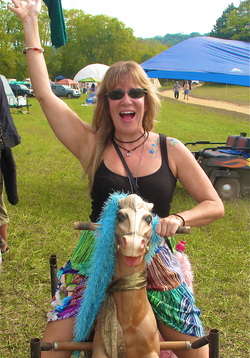
TYA USA Magazine
A career theatre artist and arts educator Sybil St. Claire works as a Lecturer in the Theatre for Young Audiences graduate program at the University of Central Florida. She is an award winning union director, and an internationally produced and published playwright, Her experience runs the gamut from theatre for the deaf to utilizing theatre as a therapeutic modality with terminally ill pediatric patients, and children in foster care. Currently, her research is focused on the psychology of creativity. Though diverse, her work shares a common thread, that of empowering others to live their best life. Sybil’s plays for young audiences, “Woolfie” and “Incantation” {Eldridge Publishing} recently enjoyed their 100th production. With performances in almost every state in the union, as well as in Europe, Canada, and Central America her contributions to the field have been honored with an Outstanding Research and Creativity award from the University of Central Florida. Her monologue, “Wake me When it’s Over” was recently accepted into an as yet unnamed anthology of spiritual monologues for young actors {Meriwether Publishing} that will also feature the work of Durang, Shaw, Miller, and Sophocles. Her work may also be found in “Audition Monologues for Student Actors: Volume II.
Sybil’s latest creation “The Invisible People,” a new musical for young audiences, composed by Amado Babadillo, explores the imaginary and spiritual life of children. We spend the evening with 12 year old Katie who is torn between growing up and giving up the things of childhood {her beloved blankie and her invisible friends}. On her revelatory journey Katie confronts and finally embraces the different aspects of herself – the noble, the frightening, and the enchanting. Having enjoyed staged reading at two equity houses the show will be ready for publication in Spring 2008. “The Invisible People” is a true story... IF you believe in magic.
A career theatre artist and arts educator Sybil St. Claire works as a Lecturer in the Theatre for Young Audiences graduate program at the University of Central Florida. She is an award winning union director, and an internationally produced and published playwright, Her experience runs the gamut from theatre for the deaf to utilizing theatre as a therapeutic modality with terminally ill pediatric patients, and children in foster care. Currently, her research is focused on the psychology of creativity. Though diverse, her work shares a common thread, that of empowering others to live their best life. Sybil’s plays for young audiences, “Woolfie” and “Incantation” {Eldridge Publishing} recently enjoyed their 100th production. With performances in almost every state in the union, as well as in Europe, Canada, and Central America her contributions to the field have been honored with an Outstanding Research and Creativity award from the University of Central Florida. Her monologue, “Wake me When it’s Over” was recently accepted into an as yet unnamed anthology of spiritual monologues for young actors {Meriwether Publishing} that will also feature the work of Durang, Shaw, Miller, and Sophocles. Her work may also be found in “Audition Monologues for Student Actors: Volume II.
Sybil’s latest creation “The Invisible People,” a new musical for young audiences, composed by Amado Babadillo, explores the imaginary and spiritual life of children. We spend the evening with 12 year old Katie who is torn between growing up and giving up the things of childhood {her beloved blankie and her invisible friends}. On her revelatory journey Katie confronts and finally embraces the different aspects of herself – the noble, the frightening, and the enchanting. Having enjoyed staged reading at two equity houses the show will be ready for publication in Spring 2008. “The Invisible People” is a true story... IF you believe in magic.
Orlando Sentinel Review - Opal

Getting kids and their parents to the same play is no easy task. Every audience member has seen small children dragged to the theater who wind up sleeping (or whining) through the second act. And every theater lover who is also a parent has seen the bland little shows that are often passed off as theater for kids. Orlando Repertory Theatre needn't worry. With Opal, its first production, the Rep has found a show that will beguile kids and grown-ups alike and -- even more important -- keep them coming back for more. That's crucial because the Rep, the successor to the old Civic Theatre of Central Florida, has inherited not only the Civic's 73 years of history with Orlando theatergoers but also some of the uncertainties the Civic provoked in its final few years. In the audience's eyes, Opal should dispel all that. It's an enchanting little musical, and even the childless will find plenty in it to gladden their eyes and ears and hearts.
From the first, Opal is different: it's set not among fairies and goblins in fantastical times but in a roughhewn Oregon lumber camp in 1904. Playwright Robert Lindsey Nassif based his story on the real-life childhood diary of Opal Whiteley, in which Whiteley claimed to be not the child of a logging family but the lost daughter of Henri d'Orleans, a member of the deposed royal family of France. In Nassif's musical, which played off-Broadway in 1992, the girl who calls herself Francoise d'Orleans loses her birth parents in a shipwreck, and she's raised by a roughhewn lumber-camp woman who renames the girl Opal after her own dead child. Put to work, Opal doesn't know how to scrub floors, but she recognizes Bon Ami scouring powder because it's French. She adopts a pig as a pet and names it Peter Paul Rubens. And she goes about trying to bring back her lost parents, as they told her in a dream, by finding a way to "make Earth glad."
The Rep's production boasts a terrific cast, about half of whom are new to Orlando theater, as well as a nifty set by Tommy Mangieri, with two jutting platforms that pass for a ship but transform easily to the lumber camp's crude cabins. Virginia McKinney's costumes and John Pinckard's lighting design are equally nice, but the production has some technical problems, or at least it did at its gala opening last weekend. At times the sound crackled and snapped; one key actor's wireless mike didn't seem to be turned up high enough, and in the second act some of the lighting flickered.More problematic is director Sybil St. Claire's decision to hide the live four-piece orchestra (two synthesizers, drums and a bass) behind the scenery. The musicians wind up sounding prerecorded, and when the actors can't see musical director Glenn Longacre, they can't follow him: The lyrics of the ensemble numbers turn to mush.But even such problems don't stifle the exuberance of these actors, who find ways to bring out the quirky humor of the show. One of the show's trademarks is the way Opal names her new neighbors -- the Man That Wears Gray Neckties, the Girl That Has No Seeing, the Thought Girl With the Far-Away Look in Her Eyes. Those names could come across as precious, but in these actors' hands they're just matter-of-fact.
Lance Noe, Allen McCoy, Mareeko Finney and Fredreka Irvine move into and out of small roles as the narrators and play the welcoming fir tree Opal calls Michelangelo: McCoy does a mean somersault, Finney and Irvine are a funny pair of snoops called the Gossip Sisters, and Noe makes a wonderful bumpkin. Heather Lee Charles is warm and sweet as the shy Thought Girl, and Erin Muroski brings dignity to the Girl That Has No Seeing, a part that could be sentimentalized to death. Sam Little finds wayward charm in Neckties, and Patti McGuire gets through the bluff exterior of the Mamma and finds the humanity underneath. Broadway veteran Shelly Burch makes a loving Sadie McKibben, the washerwoman who befriends Opal, and she has a gorgeous voice. (Too bad she's made up to look as if she's 75 years old).
And 9-year-old Sophia Bairley, who alternates the role of Opal with Kaitlyn Harrow, is that rare child actor who can hold the stage all by herself. Her voice is clear and sweet, and she makes Opal come alive with such subtlety, humor and spunk that you can't take your eyes off her. A child with less talent might make this show cloying, but this one makes it true. In fact, you see that quality all through Opal -- an inventiveness that turns what might be contrived quirky and what might be saccharine sweet. The Rep's first production isn't perfect. But there's conviction behind it, and that conviction shows up as quick wit and high spirits on the stage. Theater for kids -- and grownups -- can't ask for much more than that.
From the first, Opal is different: it's set not among fairies and goblins in fantastical times but in a roughhewn Oregon lumber camp in 1904. Playwright Robert Lindsey Nassif based his story on the real-life childhood diary of Opal Whiteley, in which Whiteley claimed to be not the child of a logging family but the lost daughter of Henri d'Orleans, a member of the deposed royal family of France. In Nassif's musical, which played off-Broadway in 1992, the girl who calls herself Francoise d'Orleans loses her birth parents in a shipwreck, and she's raised by a roughhewn lumber-camp woman who renames the girl Opal after her own dead child. Put to work, Opal doesn't know how to scrub floors, but she recognizes Bon Ami scouring powder because it's French. She adopts a pig as a pet and names it Peter Paul Rubens. And she goes about trying to bring back her lost parents, as they told her in a dream, by finding a way to "make Earth glad."
The Rep's production boasts a terrific cast, about half of whom are new to Orlando theater, as well as a nifty set by Tommy Mangieri, with two jutting platforms that pass for a ship but transform easily to the lumber camp's crude cabins. Virginia McKinney's costumes and John Pinckard's lighting design are equally nice, but the production has some technical problems, or at least it did at its gala opening last weekend. At times the sound crackled and snapped; one key actor's wireless mike didn't seem to be turned up high enough, and in the second act some of the lighting flickered.More problematic is director Sybil St. Claire's decision to hide the live four-piece orchestra (two synthesizers, drums and a bass) behind the scenery. The musicians wind up sounding prerecorded, and when the actors can't see musical director Glenn Longacre, they can't follow him: The lyrics of the ensemble numbers turn to mush.But even such problems don't stifle the exuberance of these actors, who find ways to bring out the quirky humor of the show. One of the show's trademarks is the way Opal names her new neighbors -- the Man That Wears Gray Neckties, the Girl That Has No Seeing, the Thought Girl With the Far-Away Look in Her Eyes. Those names could come across as precious, but in these actors' hands they're just matter-of-fact.
Lance Noe, Allen McCoy, Mareeko Finney and Fredreka Irvine move into and out of small roles as the narrators and play the welcoming fir tree Opal calls Michelangelo: McCoy does a mean somersault, Finney and Irvine are a funny pair of snoops called the Gossip Sisters, and Noe makes a wonderful bumpkin. Heather Lee Charles is warm and sweet as the shy Thought Girl, and Erin Muroski brings dignity to the Girl That Has No Seeing, a part that could be sentimentalized to death. Sam Little finds wayward charm in Neckties, and Patti McGuire gets through the bluff exterior of the Mamma and finds the humanity underneath. Broadway veteran Shelly Burch makes a loving Sadie McKibben, the washerwoman who befriends Opal, and she has a gorgeous voice. (Too bad she's made up to look as if she's 75 years old).
And 9-year-old Sophia Bairley, who alternates the role of Opal with Kaitlyn Harrow, is that rare child actor who can hold the stage all by herself. Her voice is clear and sweet, and she makes Opal come alive with such subtlety, humor and spunk that you can't take your eyes off her. A child with less talent might make this show cloying, but this one makes it true. In fact, you see that quality all through Opal -- an inventiveness that turns what might be contrived quirky and what might be saccharine sweet. The Rep's first production isn't perfect. But there's conviction behind it, and that conviction shows up as quick wit and high spirits on the stage. Theater for kids -- and grownups -- can't ask for much more than that.
Another Stage in Life

Sybil St. Claire believes that most theatre geared to children does them a disservice, by either glossing over vital life issues or dealing with these issues in a superficial manner. The founder and director of All Children's Theatre, St. Claire is directing Opal, the centerpiece of ACT's 15th anniversary celebration. The true story of a 7 year-old girl's experiences after being shipwrecked off the Oregon coast in 1904, the show, while it features comic and light-hearted touches, is also a serious look at the internal evolution of a child.
Founded in 1984, ACT, a tuition-based theatre company, has been the theatre-in-residence at Santa Fe Community College since 1995. ACT's mission statement reads, "Dedicated to developing life skills in young people through the performing arts." While A Fairy Tale Festival, the other anniversary production, is a more traditionally fun play put on by younger kids, the cast of Opal is comprised mainly of young teens who are part of ACT II, St. Claire's second company.
"It's not traditional children's theatre," St. Claire explains. "It has some dark undertones, and it is a very spiritual play." After Opal is shipwrecked, she must continually confront death. Sybil St. Claire, who has a Ph.D. in theatre education, insists on the importance of children being exposed to the truth about such natural processes. "I think," she says, "the theatre is an excellent springboard for exploring these issues."
One thing that hasn't changed since ACT's earliest days is the deep connection St. Claire shares with the children. "It really becomes an extended family. The wonderful thing about us is that the children really get to stay and grow," she enthuses. An internationally produced and published playwright who has been involved in theatre for more than 20 years, St. Claire keeps an especially strenuous schedule, juggling ACT with her teaching and directing career at Santa Fe College. The children she works with, though, also must confront a rigorous work schedule.
"Young people want to be challenged," St. Claire points out. "They want to excel. You just have to provide an environment where they are able to. They're working really in a professional environment -- a professional theatrical experience in an educational environment," she likes to call it. St. Claire did not specifically plan on running her own theatre company, but as a child she felt compelled to help other children. She says she always had a creative streak, writing short stories for her mother at the age of 8. The ACT environment provides St. Claire with a good deal of creative material. The most fulfilling aspect of her job is watching the children grow up. Her creativity is sparked by observing this process. "They share themselves with me," she said. "Half of what is in my plays comes out of their mouths.
Behind all of St. Claire's tenacity and perseverance there seems to be a belief, similar to the revelation of the lead character in "Opal," that people have a responsibility to make a difference in the lives of their fellow human beings. "Ultimately, I think it should matter that we were here," she emphasizes. "I think kids are our most valuable resource, and nine times out of ten they are undervalued."
St. Claire says her main goal, when it comes to working with children, is finding a way to reach them that bypasses the shallow nature of so many artistic endeavors supposedly made for them. "Certainly, I consider myself a myth buster," she explains. "I'm not fond of the messages we often send to our children. I'm interested in theatre that has a mixture of message and myth.
Founded in 1984, ACT, a tuition-based theatre company, has been the theatre-in-residence at Santa Fe Community College since 1995. ACT's mission statement reads, "Dedicated to developing life skills in young people through the performing arts." While A Fairy Tale Festival, the other anniversary production, is a more traditionally fun play put on by younger kids, the cast of Opal is comprised mainly of young teens who are part of ACT II, St. Claire's second company.
"It's not traditional children's theatre," St. Claire explains. "It has some dark undertones, and it is a very spiritual play." After Opal is shipwrecked, she must continually confront death. Sybil St. Claire, who has a Ph.D. in theatre education, insists on the importance of children being exposed to the truth about such natural processes. "I think," she says, "the theatre is an excellent springboard for exploring these issues."
One thing that hasn't changed since ACT's earliest days is the deep connection St. Claire shares with the children. "It really becomes an extended family. The wonderful thing about us is that the children really get to stay and grow," she enthuses. An internationally produced and published playwright who has been involved in theatre for more than 20 years, St. Claire keeps an especially strenuous schedule, juggling ACT with her teaching and directing career at Santa Fe College. The children she works with, though, also must confront a rigorous work schedule.
"Young people want to be challenged," St. Claire points out. "They want to excel. You just have to provide an environment where they are able to. They're working really in a professional environment -- a professional theatrical experience in an educational environment," she likes to call it. St. Claire did not specifically plan on running her own theatre company, but as a child she felt compelled to help other children. She says she always had a creative streak, writing short stories for her mother at the age of 8. The ACT environment provides St. Claire with a good deal of creative material. The most fulfilling aspect of her job is watching the children grow up. Her creativity is sparked by observing this process. "They share themselves with me," she said. "Half of what is in my plays comes out of their mouths.
Behind all of St. Claire's tenacity and perseverance there seems to be a belief, similar to the revelation of the lead character in "Opal," that people have a responsibility to make a difference in the lives of their fellow human beings. "Ultimately, I think it should matter that we were here," she emphasizes. "I think kids are our most valuable resource, and nine times out of ten they are undervalued."
St. Claire says her main goal, when it comes to working with children, is finding a way to reach them that bypasses the shallow nature of so many artistic endeavors supposedly made for them. "Certainly, I consider myself a myth buster," she explains. "I'm not fond of the messages we often send to our children. I'm interested in theatre that has a mixture of message and myth.
Exploring Landscapes of the Heart and Mind

Jim Leonard Jr.'s The Diviners is set on the banks of a river in tiny Zion, Indiana, but its true landscape is interior. Director Sybil St. Claire brings the play to Santa Fe Community College with an earthy spirituality.
St. Claire treads the psychological thickets of her actors and characters like they were her own backwoods. To see her at work in an exploratory rehearsal is like watching a painter at an easel, coaxing color and passion from her subjects. Hunched forward in her seat in the front row, chewing gum a mile a minute, St. Claire draws the character from the actor first in snatches: "Let's see some frenetic energy." Then in bold admission: "I'm going to break you of that vocal pattern." Until finally the realization dawns on the actor that you have to stop acting to take direction.
Then, what happens next is: You get real. Mike Boutwell as Buddy and Sam Little as C.C. Showers perform a rite of spiritual kinship. Sybil directs the scene from the back of the house now; her caring notes are whispered but penetrating. On stage there is openness, honesty, trust, a shared moment that hangs in the air as the scene ends. "I itch," Buddy says. "And I gotta scratch." "No, boy," Showers answers. "You tell yourself: I'm gonna save that scratch for another time."
The poignant expectancy soars beyond the two actors on stage and touches home in the audience. "Yes," Sybil says, almost inaudibly.
Life with The Invisible People

Marvaline Panky knows about Katie's blankie. Don't tell The-Things-That-Go-Bump-In-The-Night, for they might kibitz with Amaryllis, the mute dancer. Poor Duncan, the droll dog, must stoically give credit to all, even Liverwurst Jones who lives in the compost heap.
The characters of The Invisible People seem as fantastic and fanciful as the Mad Hatter, Queen of Hearts and Cheshire Cat from Lewis Carroll's Alice's Adventures In Wonderland. Yet Carroll was an adult who wrote for 19th century children. Children of the 20th century guide Sybil St. Clairewhen she writes plays for the All Children's Theatre.
"I get paid to hold on to childhood," St. Claire joked before detailing the high level of preparation, rehearsal and performance she demands from her youthful charges. "Some people think I am too hard on the children, but I am not," she added. "I set the bar high because children are limitless." The All Children's Theatre, now in residence at Santa Fe College, gives SFC students opportunities to intern and learn more about a unique art form.The affiliation with Santa Fe is one more task. St. Claire needs a dual personality as the theater's founder and director. She must be "The Adult," the manager, fundraiser and chief executive. She develops curricula and teaches classes to advanced students and younger ones called "The Not Ready For Bedtime Players." She even puts on summer theater camps. The side St. Claire likes best is that of "The Kid." She doesn't simply relate to children. She becomes a child. In the guise of child she can suspend conformity, reject the routine, unleash her imagination and revel in the innocent goodness that is much lamented if not forgotten by grownups.
She is more than a friend of children. She is their champion. "There is no theater going on in elementary school," she said, "but the children are ready to be in plays. They are not afraid to make fools of themselves, their creativity is at the top -- they are just not afraid. "I spend a half a semester in a college class getting college students to where 10-year-olds are at coming in to class." St. Claire, who teaches theater at Santa Fe, is a playwright whose work has recently been presented in Texas, Washington state, Canada, England and Gainesville. Plays for children, she said, resemble those for adults in that they have character development, plot progression, a beginning, middle and end. The difference is the freedom of expression allowed by unfettered imagination, and in distinctions between right and wrong that are untainted by the moral compromise of adults.
In The Invisible People, Katie has a problem. Some people think she needs to grow up and give up childish things, especially her blankie and invisible friends. Katie has other ideas. She dances with magical, leopard-spotted shoes, appears as a contestant on "You Bet Your Adolescence" -- a show in which everyone loses -- and confronts her greatest fear, the dreaded Boogiemen. "The Boogiemen live in the closet and they represent the negative, dark side of Katie," St. Claire said. "She needs to confront them: her greed, deceit, cowardice and hate." Katie prevails as a healthy, happy human being. A similar metamorphosis occurs in the children who act out the plays. They build confidence by overcoming stage fright, personal doubts, and the challenge of learning lines and how to act. "I thank everyone who supported me," said a 5th grader from Hidden Oak Elementary School. "I hope to be a professional actress someday." "My favorite moments are the ones that make people laugh," said a 5th grade boy from Brentwood School. "I hope people have as much fun as I do on stage."
The sixty or so children in the theater tend to be good students and involved in many activities. They're also kids. They like skateboarding, manatees, pet dogs, pet cats, climbing trees and hanging out at the mall. They are very attached to their demanding and understanding director." One reason why the theater is so special is I believe in young peoples' ideas," St. Claire said. "I give them the respect due them.
"I think kids are interested in anything that empowers them and values their abilities," she said. "I don't think Americans like children. We don't pay teachers or put supplies in the classrooms. We don't want children in four-star restaurants. We are not raising them. We put them in day-care or school."There is method acting, and there is more than method to St. Claire's direction. One way she prepares children for a play is by "jamming," role-playing sessions involving herself and the children acting like their characters. "I know I have hit pay dirt when the characters start bossing me around," she said.
She likes the kids to assert themselves, to exercise their free spirit and develop characterizations that seem natural to themselves and the audience. She applies the discipline of an adult to the creativity of a child. "I ask any group of three-year-olds who is an artist, and all of them raise their hands," St. Claire explains. "I ask a group of 13-year-olds and maybe I see one timid hand raised. What have we done to their creativity?" Playbills often have a director's statement that explains the history, philosophy and mission of the children's theater. The message may be a page in length. St. Claire sums up the theater in a line. "I think kids are important," she said.
The characters of The Invisible People seem as fantastic and fanciful as the Mad Hatter, Queen of Hearts and Cheshire Cat from Lewis Carroll's Alice's Adventures In Wonderland. Yet Carroll was an adult who wrote for 19th century children. Children of the 20th century guide Sybil St. Clairewhen she writes plays for the All Children's Theatre.
"I get paid to hold on to childhood," St. Claire joked before detailing the high level of preparation, rehearsal and performance she demands from her youthful charges. "Some people think I am too hard on the children, but I am not," she added. "I set the bar high because children are limitless." The All Children's Theatre, now in residence at Santa Fe College, gives SFC students opportunities to intern and learn more about a unique art form.The affiliation with Santa Fe is one more task. St. Claire needs a dual personality as the theater's founder and director. She must be "The Adult," the manager, fundraiser and chief executive. She develops curricula and teaches classes to advanced students and younger ones called "The Not Ready For Bedtime Players." She even puts on summer theater camps. The side St. Claire likes best is that of "The Kid." She doesn't simply relate to children. She becomes a child. In the guise of child she can suspend conformity, reject the routine, unleash her imagination and revel in the innocent goodness that is much lamented if not forgotten by grownups.
She is more than a friend of children. She is their champion. "There is no theater going on in elementary school," she said, "but the children are ready to be in plays. They are not afraid to make fools of themselves, their creativity is at the top -- they are just not afraid. "I spend a half a semester in a college class getting college students to where 10-year-olds are at coming in to class." St. Claire, who teaches theater at Santa Fe, is a playwright whose work has recently been presented in Texas, Washington state, Canada, England and Gainesville. Plays for children, she said, resemble those for adults in that they have character development, plot progression, a beginning, middle and end. The difference is the freedom of expression allowed by unfettered imagination, and in distinctions between right and wrong that are untainted by the moral compromise of adults.
In The Invisible People, Katie has a problem. Some people think she needs to grow up and give up childish things, especially her blankie and invisible friends. Katie has other ideas. She dances with magical, leopard-spotted shoes, appears as a contestant on "You Bet Your Adolescence" -- a show in which everyone loses -- and confronts her greatest fear, the dreaded Boogiemen. "The Boogiemen live in the closet and they represent the negative, dark side of Katie," St. Claire said. "She needs to confront them: her greed, deceit, cowardice and hate." Katie prevails as a healthy, happy human being. A similar metamorphosis occurs in the children who act out the plays. They build confidence by overcoming stage fright, personal doubts, and the challenge of learning lines and how to act. "I thank everyone who supported me," said a 5th grader from Hidden Oak Elementary School. "I hope to be a professional actress someday." "My favorite moments are the ones that make people laugh," said a 5th grade boy from Brentwood School. "I hope people have as much fun as I do on stage."
The sixty or so children in the theater tend to be good students and involved in many activities. They're also kids. They like skateboarding, manatees, pet dogs, pet cats, climbing trees and hanging out at the mall. They are very attached to their demanding and understanding director." One reason why the theater is so special is I believe in young peoples' ideas," St. Claire said. "I give them the respect due them.
"I think kids are interested in anything that empowers them and values their abilities," she said. "I don't think Americans like children. We don't pay teachers or put supplies in the classrooms. We don't want children in four-star restaurants. We are not raising them. We put them in day-care or school."There is method acting, and there is more than method to St. Claire's direction. One way she prepares children for a play is by "jamming," role-playing sessions involving herself and the children acting like their characters. "I know I have hit pay dirt when the characters start bossing me around," she said.
She likes the kids to assert themselves, to exercise their free spirit and develop characterizations that seem natural to themselves and the audience. She applies the discipline of an adult to the creativity of a child. "I ask any group of three-year-olds who is an artist, and all of them raise their hands," St. Claire explains. "I ask a group of 13-year-olds and maybe I see one timid hand raised. What have we done to their creativity?" Playbills often have a director's statement that explains the history, philosophy and mission of the children's theater. The message may be a page in length. St. Claire sums up the theater in a line. "I think kids are important," she said.
Acting Like a Child
Gainesville's Sybil St. Claire gives youth lessons in theatre... and in life.

MOON Magazine, by Shamrock McShane
community. For a dozen years ACT has been producing original work, the most prominent being Playground. Like other hot local playwrights, Sybil's work is being recognized around the country, with productions in Puerto Rico and in Texas, and others pending in Canada and England.
Playground is Sybil's "Day in the Life," concerning that strange race she knows best, kids. We've been there. We know this. The Greeks must have felt something like this when they saw their myths being played out. It's your first kiss," Sybil explains, "and the the stuff that goes with it. It's being alive and having everything happen at once. It's crazy. " It's childhood. It's everything that blows you away before you can grow up.
I have written plays that are plot driven and tightly structured, " Sybil says, exhaling smoke from the side of her mouth like Bogart. Playground just isn't one of them." Which is to say Playground opens up not in. It takes place in the form of diary entries, played out against that great backdrop of shared childhood, the playground.
There's no escaping the sense of time warp in Sybil's work. Eclectic and high energy though it is, time is still elongated in childhood. After all, when you're 10, a year is fully one-tenth of your life. Compare that to one of us old farts who's been around the block, what, 40, 50, 60 times. It gets old in a hurry.
But to be ten...that's the trick of Sybil St. Claire's art. In the beginning, creation is always news. That's why Mitch Stacy, then David Mamet traces his roots as a playwright from the Neighborhood Playhouse School of Theatre in New York and its great acting teacher Sanford Meisner all the way to Stanislavski, the Father of Naturalism. Old Stan, as Mamet is wont to call him, is credited with developing the system that begat Brando who begat DeNiro, and so on unto modern times.
Our version of Old Stan here in Gainesville may well be Sybil St. Claire, whose school of acting is called The All Children's Theatre, and whose Playground opens for two weeks of performances at Santa Fe Community College next week.
One thing about acting school: you don't graduate; you just become a student of life. The best schools, the best teachers are like that. What they teach is how to think, how to live. If you can turn what you've learned into art, the muses be praised. But life is meant for living and anybody who can give us a clue is a godsend.
Sybil St. Claire has been that godsend for a generation of Gainesville area kids. In person, she is ingenious...and funny. "Please pardon my smoking," she says from a booth in Harry's, directing her smoke earthward with a wave of her hand. "I quit, I start, I quit... I start. Harry's is a bar; if people can't drink and smoke what's the point? Now all my Jewish guilt will pour out, and I'm not even Jewish. Guilt without sex, the Jews and the Catholics have it down to an art. I'm a recovering Catholic. I guess that explains it."
What pours forth instead is Sybil's personality, strong and vibrant. And you can see that it is the heart and soul of The All Children's Theatre and a body of work that places Sybil in the forefront of Gainesville's burgeoning playwriting a beat reporter for the Gainesville Sun, picked up on ACT some years back to report: "Sybil St. Claire knows better than anyone how the theatre works its magic on children." What Sybil knows, as did Old Stan, is pure theatre, as evidenced not just by her Ph.D., but by her proven methods, her discipline, her professionalism. If you are a true theatrician, there is a spirit that guides your work, a wholeness, and aesthetic.
"My shows are usually double- cast," Sybil says. "So Playground has a cast of 18, which means an ensemble of 36." "Ensemble" is the operative term her. There are no stars. There aren't even any leads. "I try to avoid the term 'leads.' The kids are quick to catch on, but I have to hammer it home sometimes with the parents: we are not into star making, and we do not do the stage-parent routine."
Ironically, for Sybil to work her magic on kids, she must first demystify the theatre. Your job as an actor is not to make people look at you, but for you to look into yourself. One of Sybil's degrees in in Child Drama, which is not what we see on Saturday morning cartoons but rather a means to shape an impressionable life. 'Self-actualization' is what it's called in modern educationese, but Aristotle probably had it right when he coined it 'catharsis.'
The ACT is all about theatre as an act of discovery. It works for both players and audience; it begins with the playwright. And so Sybil is constantly going on this timeless journey into childhood, and then returning with a script, a blueprint for building a play. "The first dozen plays I wrote were so bad I'm thinking of having them expunged," Sybil laughs. "But I had a big advantage over most playwrights in that I could mount them at ACT and see what was wrong with them. Now I have a half a dozen plays that are really worth their salt."
It is a rare theatrician who can mount her own play. You have to see it with a director's vision - not just imagine it (which is hard enough) - but realize it. And yet that is the premise on which ACT is built; the idea of the play becomes real. The message to the young actor: it's not about being a star; its about the idea of the play. Now go explore it and find yourself.
"I met Sybil St. Claire when I was eight and it changed my life. It's as simple as that," says Sarah Cailen, who then continued a life in the theatre at the University of the Arts in Philadelphia, eventually founding her own company there after working at the world famous Arden Theatre. "I was just one of a number of kids from families that were, let's say, unconventional...well, weird, really. And suddenly here was this environment where I was treated with respect, where people worked together. We were just a bunch of kids getting together at Millhopper Montessori School, but right from the start Sybil would talk to us one on one, as actors, and we started to build self-esteem, we started to become like a family," says Cailen.
For Brian Shoaf, ACT was "a chance to meet other people who liked the same kinds of things I did, people I was not likely to find on my own." Those "things" were stories, characters, the masks we all hide behind and what's behind the masks, topics not normally discussed in Little League or even on the playground. Shoaf's involvement led to a theatre scholarship to Carnegie Mellon. "Without ACT my life would have taken a completely different course," Shoaf says, "because somehow I would have had to discover the mystery of art on my own.. Whereas Sybil just opened the door and let us all walk right in. We didn't know what we were doing, that we were becoming friends, learning how to work together. There was no sense of competition, just a common goal." The idea of the play.
Today ACT is in rehearsal six days a week, nine months a year, involving a main company and another in training. "When I bring my college age actors into projects with ACT," says Sidney Homan, world renowned Shakespeare scholar and fearless director of new plays, "it's always a meeting of equals; such is the quality of ACT's work."
Sybil's playwriting career is a path traveled before by the Great Man himself, David Mamet, who started writing scripts for his acting students at Goddard College. Sybil says, "Truth is, I couldn't find any material for young audiences and actors that wasn't dated or condescending. Necessity is the mother of invention. So she started writing her own plays. Now it's no longer just a local thing.
"Sybil St. Claire's talent is no secret in the world of children's theatre," says Pam Pailes, Director of Education for the prestigious Harbor Playhouse in Corpus Christi, Texas. "We flew Sybil out here to work with our kids, but mostly it was a chance to do Playground and have the playwright in attendance that convinced out artistic staff. She's an extremely talented playwright, and for us children's theatre is a serious endeavor. We were delighted to treat her as any reputable theatre would an artist in residence."
Sybil St. Claire's plays reaffirm the power of dreaming, where a little boy can conjure up all of Sherwood Forest, people it with his own oppressors and comrades, and come back from his adventures ready to battle reality, where you can befriend the Invisible People, even though you may end up a contestant on "You Bet Your Adolescence," the show where everybody is a loser, where tragedy meets comedy at the crossroads of melodrama, as in Sweet Polly's Lament. As we are told at the beginning of The Invisible People, "This is a true story..IF you believe in magic." It's easy when it's real.
community. For a dozen years ACT has been producing original work, the most prominent being Playground. Like other hot local playwrights, Sybil's work is being recognized around the country, with productions in Puerto Rico and in Texas, and others pending in Canada and England.
Playground is Sybil's "Day in the Life," concerning that strange race she knows best, kids. We've been there. We know this. The Greeks must have felt something like this when they saw their myths being played out. It's your first kiss," Sybil explains, "and the the stuff that goes with it. It's being alive and having everything happen at once. It's crazy. " It's childhood. It's everything that blows you away before you can grow up.
I have written plays that are plot driven and tightly structured, " Sybil says, exhaling smoke from the side of her mouth like Bogart. Playground just isn't one of them." Which is to say Playground opens up not in. It takes place in the form of diary entries, played out against that great backdrop of shared childhood, the playground.
There's no escaping the sense of time warp in Sybil's work. Eclectic and high energy though it is, time is still elongated in childhood. After all, when you're 10, a year is fully one-tenth of your life. Compare that to one of us old farts who's been around the block, what, 40, 50, 60 times. It gets old in a hurry.
But to be ten...that's the trick of Sybil St. Claire's art. In the beginning, creation is always news. That's why Mitch Stacy, then David Mamet traces his roots as a playwright from the Neighborhood Playhouse School of Theatre in New York and its great acting teacher Sanford Meisner all the way to Stanislavski, the Father of Naturalism. Old Stan, as Mamet is wont to call him, is credited with developing the system that begat Brando who begat DeNiro, and so on unto modern times.
Our version of Old Stan here in Gainesville may well be Sybil St. Claire, whose school of acting is called The All Children's Theatre, and whose Playground opens for two weeks of performances at Santa Fe Community College next week.
One thing about acting school: you don't graduate; you just become a student of life. The best schools, the best teachers are like that. What they teach is how to think, how to live. If you can turn what you've learned into art, the muses be praised. But life is meant for living and anybody who can give us a clue is a godsend.
Sybil St. Claire has been that godsend for a generation of Gainesville area kids. In person, she is ingenious...and funny. "Please pardon my smoking," she says from a booth in Harry's, directing her smoke earthward with a wave of her hand. "I quit, I start, I quit... I start. Harry's is a bar; if people can't drink and smoke what's the point? Now all my Jewish guilt will pour out, and I'm not even Jewish. Guilt without sex, the Jews and the Catholics have it down to an art. I'm a recovering Catholic. I guess that explains it."
What pours forth instead is Sybil's personality, strong and vibrant. And you can see that it is the heart and soul of The All Children's Theatre and a body of work that places Sybil in the forefront of Gainesville's burgeoning playwriting a beat reporter for the Gainesville Sun, picked up on ACT some years back to report: "Sybil St. Claire knows better than anyone how the theatre works its magic on children." What Sybil knows, as did Old Stan, is pure theatre, as evidenced not just by her Ph.D., but by her proven methods, her discipline, her professionalism. If you are a true theatrician, there is a spirit that guides your work, a wholeness, and aesthetic.
"My shows are usually double- cast," Sybil says. "So Playground has a cast of 18, which means an ensemble of 36." "Ensemble" is the operative term her. There are no stars. There aren't even any leads. "I try to avoid the term 'leads.' The kids are quick to catch on, but I have to hammer it home sometimes with the parents: we are not into star making, and we do not do the stage-parent routine."
Ironically, for Sybil to work her magic on kids, she must first demystify the theatre. Your job as an actor is not to make people look at you, but for you to look into yourself. One of Sybil's degrees in in Child Drama, which is not what we see on Saturday morning cartoons but rather a means to shape an impressionable life. 'Self-actualization' is what it's called in modern educationese, but Aristotle probably had it right when he coined it 'catharsis.'
The ACT is all about theatre as an act of discovery. It works for both players and audience; it begins with the playwright. And so Sybil is constantly going on this timeless journey into childhood, and then returning with a script, a blueprint for building a play. "The first dozen plays I wrote were so bad I'm thinking of having them expunged," Sybil laughs. "But I had a big advantage over most playwrights in that I could mount them at ACT and see what was wrong with them. Now I have a half a dozen plays that are really worth their salt."
It is a rare theatrician who can mount her own play. You have to see it with a director's vision - not just imagine it (which is hard enough) - but realize it. And yet that is the premise on which ACT is built; the idea of the play becomes real. The message to the young actor: it's not about being a star; its about the idea of the play. Now go explore it and find yourself.
"I met Sybil St. Claire when I was eight and it changed my life. It's as simple as that," says Sarah Cailen, who then continued a life in the theatre at the University of the Arts in Philadelphia, eventually founding her own company there after working at the world famous Arden Theatre. "I was just one of a number of kids from families that were, let's say, unconventional...well, weird, really. And suddenly here was this environment where I was treated with respect, where people worked together. We were just a bunch of kids getting together at Millhopper Montessori School, but right from the start Sybil would talk to us one on one, as actors, and we started to build self-esteem, we started to become like a family," says Cailen.
For Brian Shoaf, ACT was "a chance to meet other people who liked the same kinds of things I did, people I was not likely to find on my own." Those "things" were stories, characters, the masks we all hide behind and what's behind the masks, topics not normally discussed in Little League or even on the playground. Shoaf's involvement led to a theatre scholarship to Carnegie Mellon. "Without ACT my life would have taken a completely different course," Shoaf says, "because somehow I would have had to discover the mystery of art on my own.. Whereas Sybil just opened the door and let us all walk right in. We didn't know what we were doing, that we were becoming friends, learning how to work together. There was no sense of competition, just a common goal." The idea of the play.
Today ACT is in rehearsal six days a week, nine months a year, involving a main company and another in training. "When I bring my college age actors into projects with ACT," says Sidney Homan, world renowned Shakespeare scholar and fearless director of new plays, "it's always a meeting of equals; such is the quality of ACT's work."
Sybil's playwriting career is a path traveled before by the Great Man himself, David Mamet, who started writing scripts for his acting students at Goddard College. Sybil says, "Truth is, I couldn't find any material for young audiences and actors that wasn't dated or condescending. Necessity is the mother of invention. So she started writing her own plays. Now it's no longer just a local thing.
"Sybil St. Claire's talent is no secret in the world of children's theatre," says Pam Pailes, Director of Education for the prestigious Harbor Playhouse in Corpus Christi, Texas. "We flew Sybil out here to work with our kids, but mostly it was a chance to do Playground and have the playwright in attendance that convinced out artistic staff. She's an extremely talented playwright, and for us children's theatre is a serious endeavor. We were delighted to treat her as any reputable theatre would an artist in residence."
Sybil St. Claire's plays reaffirm the power of dreaming, where a little boy can conjure up all of Sherwood Forest, people it with his own oppressors and comrades, and come back from his adventures ready to battle reality, where you can befriend the Invisible People, even though you may end up a contestant on "You Bet Your Adolescence," the show where everybody is a loser, where tragedy meets comedy at the crossroads of melodrama, as in Sweet Polly's Lament. As we are told at the beginning of The Invisible People, "This is a true story..IF you believe in magic." It's easy when it's real.


